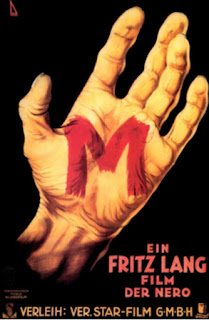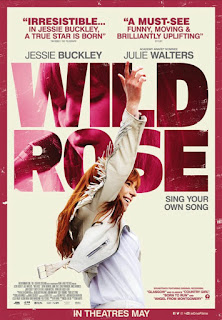BFI Watchlist - M (1931)
Directed by Fritz Lang.
Written by Thea von Harbou and Fritz Lang.
Starring Peter Lorre.
Restored in 2000.
After avoiding any German expressionist films, thanks to the not so wonderful experience watching Metropolis, I finally caved and decided to tackle the final German expressionist film on the BFI watchlist.
I won't lie, I struggled a bit with the film because it just seemed to drag on a bit. The plot was great, but the whole thing just seems a bit too slow.
Although the scene where the young man brands the murder with a chalk M by writing it into his hand and then “accidentally” bumping into the murder so he could brand the back of him was very clever!
Also, I’ll never be able listen to “In the Hall of the Mountain King” by Edvard Grieg without thinking of a child murderer. Thanks for that one Lang.
M is Lang’s first sound film, when there is dialogue the film is great, but when there is no dialogue, you are watching scenes in total silence. Which I found terribly awkward and made me lose focus in the film.
However, saying all this, I think it is a very relevant film of it’s time.
The film shows Beckert, our murderer managing to consistently avoid getting caught for murder. This is because the authorities - the police organisation is disintegrating. Which leads to Beckert finally getting caught by the city’s own criminal organization who have taken the need to carry out justice into their own hands. But since they are criminals what they call justice is actually the complete opposite of what true justice is.
M was released in 1933, Germany was still suffering due to the Great Depression, the Weimar republic was falling apart and losing authority over the people of Germany and, Hitler and his Nazi party were gaining power and influence. If you think about it, this can all be referenced in the film - whether Lang intended it or not.
Beckert (the murderer) represents that chaos and devastation of the Great Depression. His actions are causing public unrest, desperation and causing the general public to lose faith of those in power. In this case the police force are the struggling authority.
Following from this point, Police force represent the Weimar Republic and their failing ability to stay in control and have an authoritative influence.
This is especially relevant in the sequence which jump cuts between two scenes where the the police force debating how to catch the killer and the leaders of the criminal organisation debating how they can catch the killer. This sequence is very relevant because there is contrast in the sense that one group care about the law and the other operate against the law but there is the similarity of the fact that they want to catch the killer because it benefits them.
This leads onto my next point that the criminal organisation represent the Nazi party, who took matters into their own hands, claiming that they are carrying out justice but are actually only in it for personal gain. Much like the criminal organisation they were using this awful situation in Germany for their own personal gain.
The nazi party were able to gain power and influence very quickly thanks to the great depression.
The film gives us a perfect example of how when the system falls apart the corrupt can easily gain power, control, mass influence and create utter chaos.
Overall, it wasn’t a film I particularly enjoyed entertainment wise, but in terms of political relevance it is extremely important and powerful.
Feel free to leave a comment below your thoughts on the film. You can also contact me via twitter (@niamhcrawley_), instagram (@crawley.filmandtv), facebook or, you can email me at crawley.filmandtv2000@gmail.com.



Comments
Post a Comment